|
|
|
|
News The Project Technology RoboSpatium Contribute Subject index Download Responses Games Gadgets Contact <<< NEJE KZ3000 Laser engraver Print head HP6602 >>> Plasma printerThe video about the plasma printerMechanics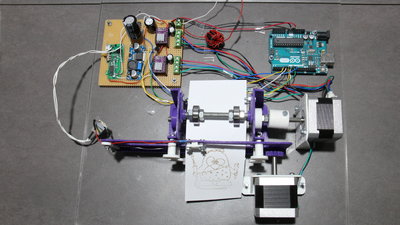
In search of alternative printing methods for an art project initiated by Theo Deutinger (www.td-architects.eu), I have built this tiny plasma printer. 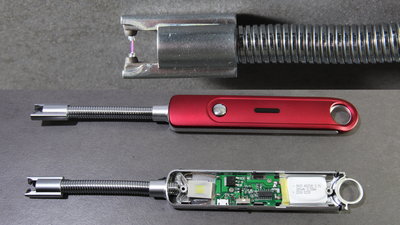
This machine is based on a battery operated plasma lighter. The circuit board insides the housing generates a high voltage via a small transformer, the primary winding of which is driven by an alternating voltage of high frequency. With that, the high voltage required to ignite the plasma arc builds up in the secondary winding. 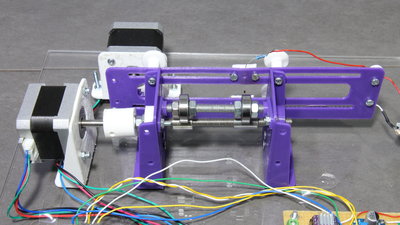
The mechanical components of the plasma printer are mostly 3D printed: What is needed is a mechanism for paper feed, which is driven by one stepper motor while a second stepper motor is used for the mechanics that moves the electrodes perpendicular to the paper feed. Electronics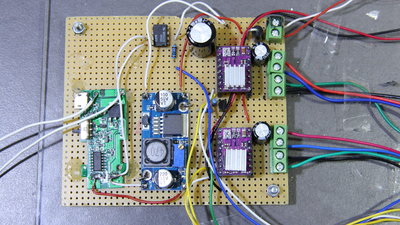
The electronics board is composed of two stepper motor drivers, the lighter circuit board and a 3.7V DC converter that replaces the lighter's battery. My first attempt of controlling the stepper motors didn't really work: The sparks forming between the electrodes in combination with the cheap electronics generate parasitic signals resulting in random movement of the stepper motors. 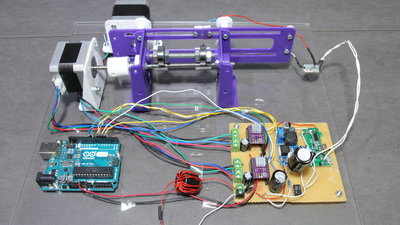
My quick and dirty solution was adding another large capacitor, a suppression choke and a resistor in the high voltage circuit of the transformer to reduce the power of that radio transmitter - event with that I won't get the FCC seal of approval for this device... The printer is still quite sensitive to the interference signals: The distance between the electrodes is a particularly important parameter. The smaller the gap, the worser the interference. If the stepper motors move when the plasma is fired, the distance should be increased. Shielded wires to the electrodes should also improveme the circuit. 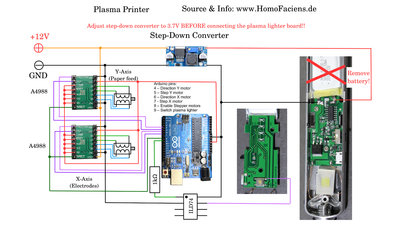
Circuit layout Sample print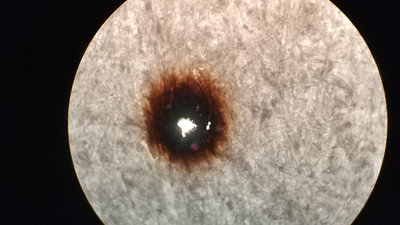
In order for the plasma to ignite, the paper must be punched through. A look through the microscope shows the hole in the center of the printed dot. The edges of the plasma are charred by the heat of the plasma, creating a black dot on the paper. Paper is made up of many small, randomly distributed fibers that offer a wide variety of paths for the flow of electricity through this jungle. The plasma rarely takes the shortest path between the electrodes, which is why the print dots are set with a visible error from the intended coordinates. 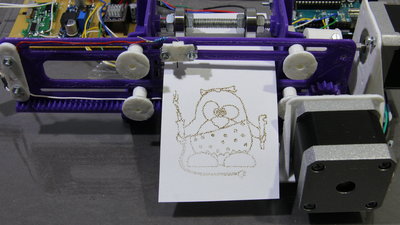
So the graphics must be transformed into a grid with a certain distance between the dots - simmilar to good old newspaper pictures. There should also a delay between firing two plasma arcs. Because of the mentioned error from given coordinates for each dot, the print quality isn't great. However you can identify my Tux mascot on this print. I certainly haven't made a breakthrough in printing technology with this plasma printer, but it is for sure another interesting device for teaching basic knowledge. SoftwareThe software consists of two components:Number one runs on the Arduino UNO and the second component on a PC. This command line program runs on Linux, I tested it with Raspberry OS on a Pi-Top [3]. Source code, circuit diagram and installation instructions are part of the download package. Sourcing partsWhen buying components via the affiliate partner links I have listed in the table (or through the banners on my pages) you help to keep my my projects going - many thanks!Clicking on the links does not mean you have to buy - you can simply browse through the pages ;-) Of course, supporting my freely accessible educational platform without shopping but by making a donation or becoming a Patreon also works. Many thanks to everyone who already sent me an obol! If you know more parts that are good for building circuits shown on this page, please leave a comment.
<<< NEJE KZ3000 Laser engraver Print head HP6602 >>> News The Project Technology RoboSpatium Contribute Subject index Archives Download Responses Games Links Gadgets Contact Imprint |
|
|